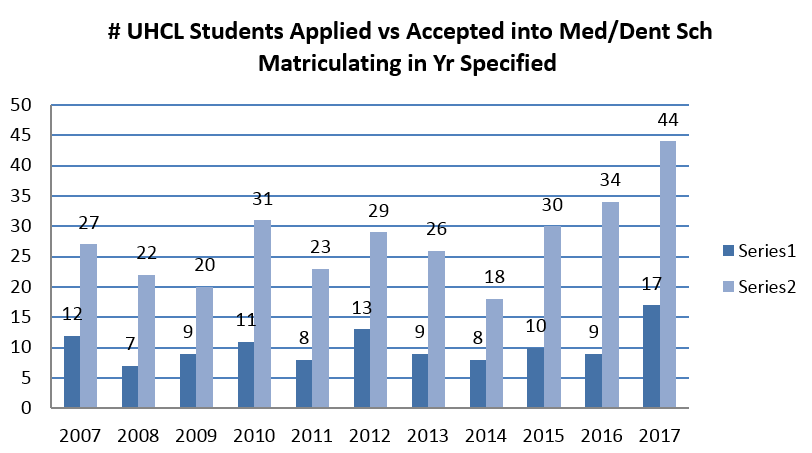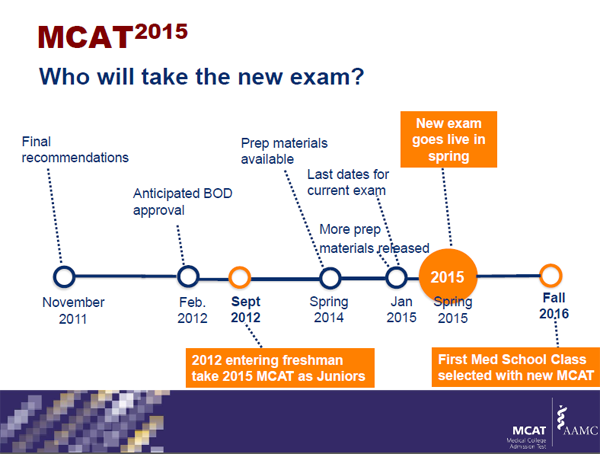
Pre-Health Students
Health Professions Advisory Committee

The faculty members who serve on the Health Professions Advisory Committee (HPAC)
dedicate themselves to helping students pursue careers in health care. They discuss
academic interests and career options with students who are working toward their undergraduate
or graduate degrees, HPAC members offer valuable insights to help you reach your academic
and professional goals.
If you are considering applying to a postgraduate health professions program, you
need to start the application process now. Chances are if you haven't already begun
the application process, you are behind schedule!
The HPAC Members
Please contact Dr. Richard Puzdrowski, Committee Chair, at puzdrowski@uhcl.edu for list of committee members.
NOTE: Students that entered college as freshman in September 2012 and plan to take the MCAT in the spring of 2015 or after will be taking a new MCAT exam. The timeline for implementation of this new exam is shown below, along with a summary of each of the new MCAT sections. (©2012 Association of American Medical Colleges. All rights reserved. Reproduced with permission.)

-
Implementation time line for MCAT2015
-
MCAT2015 exam sections
| Preview Guide for the MCAT Exam (Second Edition) | Approximate number of items | Approximate number of minutes |
|---|---|---|
|
Biological and Biochemical Foundations of Living Systems This section asks you to combine your knowledge of foundational concepts in the biological and biochemical sciences with your scientific inquiry, reasoning, and research and statistics skills to solve problems that demonstrate readiness for medical school. Understanding the processes unique to living organisms, such as growing and reproducing, maintaining a constant internal environment, acquiring materials and energy, sensing and responding to environmental changes, and adapting, is important to the study of medicine. You will be tested on your knowledge of how cells and organ systems within an organism act both independently and in concert to accomplish these processes, as well as your ability to reason about these processes at various levels of biological organization within a living system. |
67 | 95 |
|
Chemical and Physical Foundations of Biological Systems This section asks you to combine your knowledge of foundational concepts in the chemical and physical sciences with your scientific inquiry, reasoning, and research and statistics skills to solve problems that demonstrate readiness for medical school. Understanding the mechanical, physical, and biochemical functions of tissues, organs, and organ systems is important to the study of medicine. You will be tested on your knowledge of the basic chemical and physical principles that underlie the mechanisms operating in the human body, and your ability to apply an understanding of these general principles to living systems. |
67 | 95 |
|
Psychological, Social, and Biological Foundations of Behavior This section tests your knowledge and use of the concepts in psychology, sociology, biology, research methods, and statistics that provide a solid foundation for learning in medical school about the behavioral and socio-cultural determinants of health and health outcomes. Understanding the behavioral and socio-cultural determinants of health is important to the study of medicine. You will be tested on your knowledge of the ways in which psychological, social, and biological factors influence perceptions and reactions to the world; behavior, and behavior change; what people think about themselves and others; the cultural and social differences that influence well-being; and the relationships between social stratification, access to resources, and well-being. |
67 | 95 |
|
Critical Analysis and Reasoning Skills This section asks you to critically analyze information from a wide range of social sciences and humanities disciplines. Specific knowledge of these disciplines is not required for this section; all of the information you will need appears in the passages provided. Among the areas from which content is drawn are ethics and philosophy, cultural studies, and population health. |
60 | 90 |
Applying to a Health Professions Program
The application process for students applying to a health professions program may vary, depending on your area of interest and on the particular school to which you apply. In general, take the following steps to prepare your application.
Decide which schools you are interested in. Visit their campus or research their program via their website. Find out what courses they require of their applicants, and any other unique application requirements. In general, students applying to medical or dental school find that many medical schools require the following science courses:
- General Chemistry - One year with laboratory
- Organic Chemistry - One year with laboratory
- General Physics - One year with laboratory
- Calculus - One-half year (requirement varies)
- Biology - Two years, one with laboratory
There may be additional course requirements (example biochemistry, microbiology, etc.). Be sure to check the prerequisite course requirements for the school(s) that you are planning to apply to and make sure these course are on your degree plan.
Pay attention to the application deadlines for the schools or application services where you submit your application. For medical and dental school applicants, you should prepare and submit your application as early as possible in the application cycle (May or June if possible) the year before you plan to begin medical or dental school. Many schools in Texas begin interviewing in early to mid-August for entrance the following fall. If you wait until August or later to complete and submit your application, you lower your chances of getting an interview for entrance the following fall. If you don't get an interview, you will not get in! So, complete your application early to maximize your chances.
In consultation with your faculty advisor, decide what courses you need to take to prepare you for the aptitude exam (MCAT, DAT, etc.) relevant to your area of interest.
Get to know your professors, especially those on the committee. Let them know your plans. These are the faculty members who will be writing your recommendation letters.
Many medical schools also prize an applicant's extracurricular activities, such as:
- Experience in a medical setting (volunteering at a hospital, shadowing a physician on rounds, working in a physician's office, etc.). Some schools require such experience. Baylor College of Dentistry and UT Dental School both require applicants to provide a recommendation letter from a practicing dentist.
- Involvement in a community organization (serving as an officer, participating in the organization's activities, etc.). Doing community service (coaching a youth soccer team, visiting the sick, involvement in a charity.
- Participation in a scientific research project.
Requesting Letters of Recommendation from the Committee
When requesting letters of recommendation from the HPAC Committee, you should provide:
- All required forms to be submitted with the letter. This may vary by school or application service.
- A list of addresses for the letter's recipients if the letters are to be sent by standard
mail. If letters are to be sent by email, or uploaded to an application website, please
provide the email address or web address the letter is to be sent/uploaded to.
A stamped envelope if the letter is to be sent by mail. - A statement of purpose explaining why you want to pursue a career in health care. A draft of the personal statement you are preparing for your application will suffice.
- A summary of your shadowing experiences, including the number of hours you spent at each shadowing venue.
- A summary of your community service, including the number of hours you devoted to each service activity.
- A summary of organizations you belong to, offices you have held in these organizations, and events you have participated in and helped organize.
- A photo of yourself (a clear photocopy of your driver's license photo will suffice).
Please provide the above information to the Committee Chair's office (Suite 3525, office 7) no later than the third Monday in September. If you request a recommendation letter from the committee, you may not also request letters from individual committee members.
Application Timeline for Medical, Dental, and Veterinary School
Please check the Texas Medical and Dental Schools Application Service (TMDSAS) website to confirm the accuracy of these dates.
The Texas Medical and Dental School Application Service (TMDSAS) begins accepting applications in early May for admission in the fall of the following year. Applications must be completed by October 1. However, you should bear two things in mind:
The earlier in the application cycle you complete your application the better. It
shows the admissions committees that you are plan ahead and are prepared to start
the next phase of your education.
The medical and dental schools in Texas interview applicants starting in August and
ending in December. If you wait until October 1 to complete your application you will
miss the opportunity to get an interview in August or September and therefore reduce
your chances of getting an interview. As was said above, if don't get an interview
your will not get in. So, don't put off completing your application until September!
Be sure you know the important dates and deadlines for the application cycle you are
applying in.
Links of Interest
Dental School
- American Dental Association
- Texas Medical and Dental School Application Service
- UTHSC at Houston Dental Branch
- UTHSC at San Antonio Dental School
- Texas A&M College of Dentistry
Medical School
- Texas Medical and Dental School Application Service
- MCAT
- American Medical College Application Service
- Association of American Medical Colleges
- Medfools: Medical education from start to finish
- American Osteopathic Association






